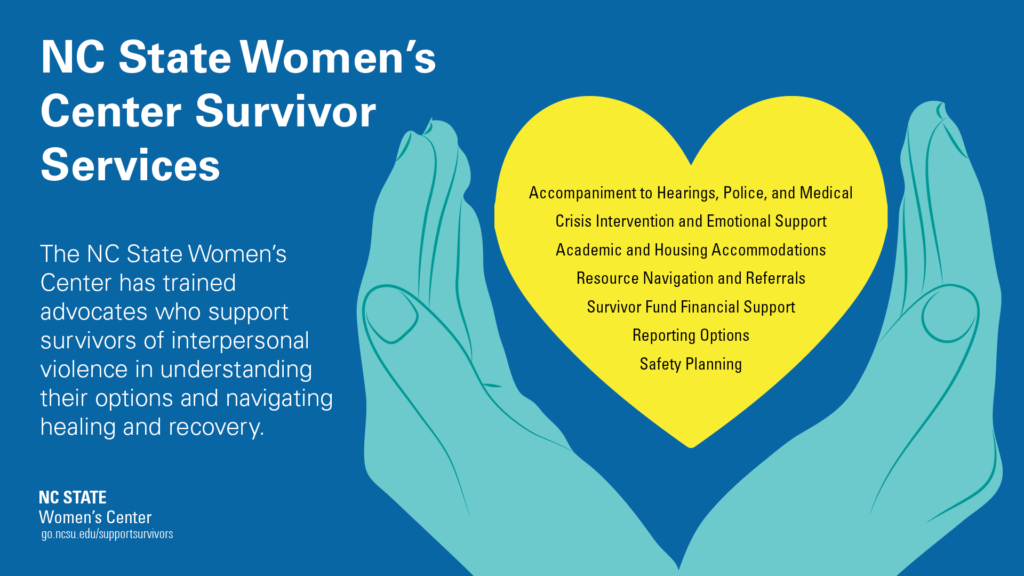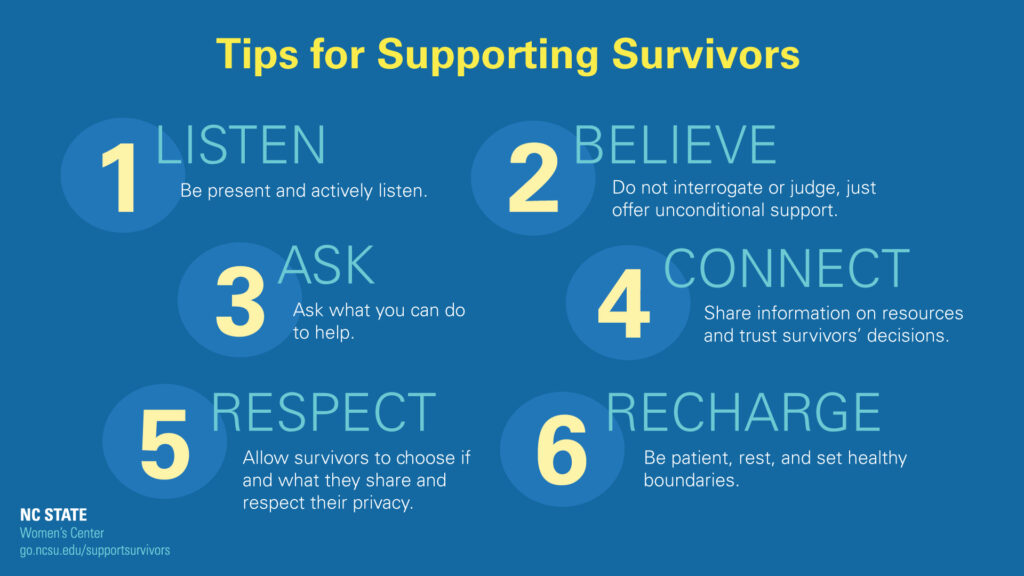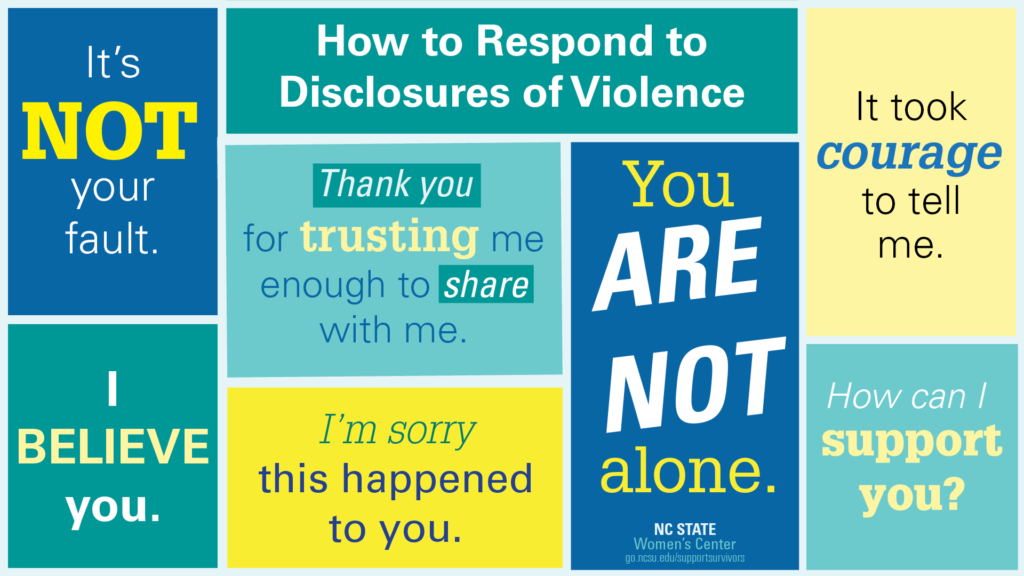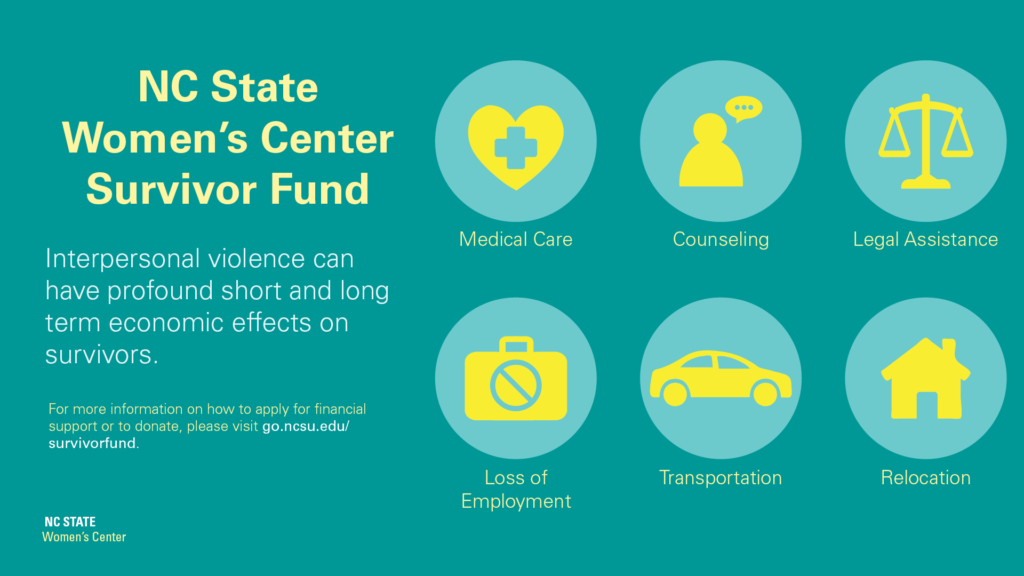Survivor Services
The Women's Center provides survivor support services by appointment only. Services are open to students of any gender identity.
The NC State Women’s Center has trained advocates who support survivors of interpersonal violence (domestic/dating violence, sexual assault, stalking, etc.) in understanding their options and navigating healing and recovery. The NC State Women’s Center serves ALL NC State students and we welcome students of all gender identities, gender expressions, and sexual orientations.
Services include accompaniment to court, student conduct hearings, law enforcement agencies, and medical services; crisis intervention and emotional support; academic and housing accommodations; resource navigation and referrals; financial support; reporting options; and safety planning.
Services are by appointment only. Students can access services by calling the 24/7 Sexual Assault Helpline at 919.515.4444, or by emailing ncsuadvocate@ncsu.edu to request an appointment.
Please note that advocates are responsible employees and have an obligation to report all disclosures of interpersonal violence to NC State University. After a report is made, the university’s Title IX coordinator will reach out with an email offering resources and a chance to meet, which you have the right to accept or decline. For additional support connecting to resources, filing a report, and/or seeking supportive measures, please visit go.ncsu.edu/complainant-resources.
Meet with a Women’s Center Advocate

If you or someone you know is dealing with interpersonal violence, know that you are not alone. The Women’s Center has trained advocates who regularly work with survivors of relationship violence, sexual assault and stalking. We see you, we hear you, we believe you.
We know that survivors of interpersonal violence may be dealing with a range of emotions, as well as academic and physical stress. Our trained advocates are here to listen and help survivors understand all of their options whether on campus or off. Advocates are able to help survivors navigate the reporting process on campus, connect them to resources, and make referrals on their behalf.
What can an advocate help me with?
- Understanding your options and rights
- Making referrals to on- and off-campus resources
- Obtaining a restraining order or no contact order
- Reporting to Title IX and/or police
- Acting as your support person with Title IX and/or police, during court and student conduct hearings, or if/when you receive medical care
- Helping with academic and housing accommodations
- Assisting you in identifying coping mechanisms during healing and recovery
- Supporting you in creating a safety plan
- Offering financial support to cover expenses related to interpersonal violence
Services are by appointment only. Students can access services by calling the 24/7 Sexual Assault Helpline at 919.515.4444, or by emailing ncsuadvocate@ncsu.edu to request an appointment.
Please note that advocates are responsible employees and have an obligation to report all disclosures of interpersonal violence to NC State University. After a report is made, the university’s Title IX coordinator will reach out with an email offering resources and a chance to meet, which you have the right to accept or decline. For additional support connecting to resources, filing a report, and/or seeking supportive measures, please visit go.ncsu.edu/complainant-resources.
Tips for Supporting Survivors

Tips for dealing with disclosure of interpersonal violence:
- Believe the survivor and tell them so.
- Do not blame the survivor for the assault. Be careful of your non-verbals as well as verbals.
- Just listen.
- Do not take control of the situation. Let the survivor make their own decisions about things like getting evidence collected, reporting, or getting help.
- Know your resources; offer to walk a survivor over to the Counseling Center if they need to talk to someone confidentially.
- Let the survivor recover at their own pace–know this may take weeks, months, or years.
- Do not ignore your own feelings, but do not let them overshadow the feelings of the survivor.

Things that are always up to a survivor:
- Whether or not to disclose their story to you or anyone else.
- Whether to use the term “victim” or “survivor” when describing themselves.
- Whether or not to report to the police.
- Whether or not to have evidence collected (rape kit).
- What resources to use, if any at all.
- What their healing path will look like.
Women’s Center Survivor Fund

The NC State Women’s Center Survivor Fund provides for immediate and unforeseen needs that arise as a direct result of a student experiencing interpersonal violence. Funds can be used for (but are not limited to) medical care, counseling/therapy, legal assistance, loss of employment, transportation, relocation, child care, food and other basic needs, and/or technology equipment.
Applicants must:
- Be a current NC State student or have been enrolled as an NC State student at some point during the semester in which support is sought;
- Be a survivor of interpersonal violence (i.e. rape, sexual assault, sexual harassment, domestic/dating violence, stalking, etc.); and
- Request assistance from the fund within one year of incurring the expense. Note: the length of time between incident and application does not matter.
Applicants may request up to $500 during their time at NC State. Submission of an application does not guarantee funding.
If you have questions about the Survivor Fund, please email ncsuadvocate@ncsu.edu.
If you are interested in donating to the Survivor Fund, please visit go.ncsu.edu/donatesurvivorfund
Please note that the individuals collecting these applications are responsible employees. That means they have an obligation to report all disclosures of interpersonal violence to NC State University. After a report is made, the university’s Title IX coordinator will reach out with an email offering resources and a chance to meet, which you have the right to accept or decline.
Unity ID Change
While an individual’s legal name is the default used on-campus, NC State University recognizes that students who have experienced interpersonal violence may wish to change their preferred name and/or Unity ID in order to ensure their safety and/or reclaim their independence. As long as the use of this preferred name is not for misrepresentation, the university acknowledges that a preferred name can, and should, be used wherever appropriate in the course of university business and education. Students, faculty, and staff may choose to identify themselves within the university community with preferred first, middle and/or last names that differ from their legal names.
Updating Preferred Names
For Students, you can update your preferred name in the MyPack portal. Go to MyPack portal > Student homepage > Personal Information tile > Personal Details. Updates to your middle and/or last name must be completed in the Office of Registration and Records, 1000 Harris Hall.
For employees, you can update your preferred name in the MyPack portal. Go to MyPack portal > Employee Self-Service > Personal Details > Campus Directory Listing.
Please visit Student Services for additional information and instructions.
Unity ID Rename Procedure
Your Unity ID reflects your legal name at the time of enrollment. Updating your preferred name will NOT change your Unity ID; it will only change the preferred name associated with your Unity ID. For example, if your legal name is Brianna Denise Wolf, your Unity ID might be something like bdwolf. If your preferred name is Brianna Stevens, your name would appear as Brianna Stevens but you would still have the Unity ID of bdwolf.
If you are a student who would like to change your Unity ID, the Women’s Center Director can request a Unity ID change on your behalf under one of the allowable extenuating circumstances, including extreme emotional trauma. The rename process will assign a new Unity ID that is not name-based, nor user chosen. Changing your Unity ID does not require a legal name change.
To request a Unity ID name change, please email jfkossen@ncsu.edu with your current Unity ID and name.
Survivor’s Bill of Rights
All survivors of interpersonal violence have the following rights as stated by the Federal Campus Sexual Assault Victims Bill of Rights:
- Survivors shall be notified of their options to notify law enforcement.
- Survivors and the accused shall be informed of any outcome of a disciplinary hearing.
- Both parties must have the same opportunity to have others present in a disciplinary hearing (ie witnesses, an attorney, an advocate).
- Survivors shall be notified of counseling services that they may utilize.
- Survivors shall be notified of options for changing academic and living situations.